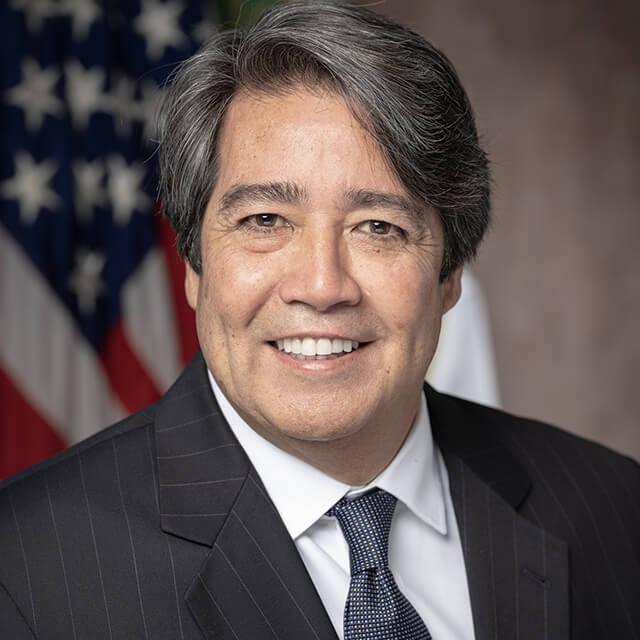UNC Charlotte Marriott Hotel and Conference Center
THEME: INDUSTRIAL COMPETITIVENESS AND THE EVOLVING ENERGY LANDSCAPE
The industrial sector accounts for one-third of the United States' primary energy use, so ongoing shifts in energy systems present enormous opportunities and risks for this sector. Industrial competitiveness is going to depend on continued investments in innovation, efficiency, and advances in energy solutions.
- Research and development have always been a national strength. Ongoing shifts also require innovation in business models across the energy spectrum.
- Lawrence Berkeley National Lab estimates that only 50% of industrial energy is used productively – leading to an enormous waste of resources. Cost reduction through efficiency is a proven pathway to increasing profitability.
- Our trading partners are setting new standards for energy and resource efficiency. They continue to advance technologies that improve sustainable performance.
How do you take advantage of the opportunity and minimize the risk? How does your network support you? The 2025 Summer Study on Energy Efficiency in Industry brings together professionals from around the globe to Charlotte, North Carolina – ground zero for recent industrial investment, accompanied by a statewide commitment to modernizing the electricity sector by the year 2050. We will look at policies, funding, operations, and technology to sustain industrial competitiveness for individual firms and the sector at large. We’ll ask how public-private partnerships can act now to develop the workforce we need for success. We’ll compare national and state policy to look for immediate advantage and long-term leverage.
You’ll leave the Summer Study with an expanded network and an action plan to meet your goals.
The following tracks will be the highlight of the conference program:
Track 1: Grids, Pipelines, and Funding
Track 2: Technology and Operations
Track 3: Bringing New Energy to Leadership
Track 4: Collaborating through Complexity: Navigating Industrial Value Chains
Participants: Corporate leaders, energy managers and government relations professionals; equipment manufacturers and engineering services providers; labor representatives; energy efficiency program administrators, evaluators, and implementors; public utility commission and consumer counselor staff members; professionals in the utility sector with responsibilities for efficiency programs, resource planning, regulatory compliance and government relations; energy efficiency solution providers; federal and state energy and economic development officials; energy and sustainability management firms; and energy efficiency, clean energy and equity advocacy organizations.
To view a list of the 2023 participating organizations, click here.
2025 Co-Chairs
 |  | |
| Ammi Amarnath EPRI | Evelyn Lundhild IESO |
Tracks/Track Leaders
Click on the title of each track for a full description.
Track 1: Grids, Pipes, and Funding
 |  | |
| Steven Coley TVA | Baskar Vairamohan EPRI |
Track 2: Technology and Operations
 |  | |
| William Peter Oak Ridge National Laboratory | John Seryak Go Sustainable Energy |
Track 3: Bringing New Energy to Leadership
 |  | |
| Wendy Gibson Stillwater Energy | Andrew Knox Goldfin Consulting |
Track 4: Collaborating through Complexity: Navigating Industrial Value Chains
 |  | |
| Fiona Glasford IESO | Andrea Marr Cadmus Group |
Program
To view the Full Conference Program and Presentations, click here.
To view the Program-at-a-Glance, click here.
To view individual Track Sessions, click on the tracks below
TRACK 1 TRACK 2 TRACK 3 TRACK 4
Program Highlights and Side Events
SEM Summit – July 16 (11:00 am – 5:30 pm) – Fee to attend: $150 – includes lunch
Kick off your 2025 Summer Study with the North American Strategic Energy Management (SEM) Collaborative at the 9th annual SEM Summit! At this year’s Summit, attendees will meet and catch up with peers, dig deep into different tracks based on level of experience, and collaborate. We will also reflect on what we have accomplished, with highlights from our working groups, and announce this year’s SEM Award winners. Whether you are new to the work or a seasoned professional, there is something for you at the Summit. To learn more about the North American SEM Collaborative visit our website.
Industrial Heat Pump (IHP) Alliance Buyers Bootcamp – July 16 (9:00 am – 5:00 pm) – Fee to attend: $50 – by invitation only.
The IHP Buyers Bootcamp is designed for industrial end-users (i.e., facility managers and sustainability engineers) looking to deepen their understanding of industrial heat pumps. This full-day interactive program will equip participants with the technical knowledge, financial tools, and strategic insights necessary to evaluate, plan, and execute successful IHP projects. From technical integration to securing financing and navigating utility considerations, attendees will leave the Bootcamp with actionable strategies to advance their IHP projects. Please reach out to hchen@aceee.org if you have any questions. Fee to attend: $50.
 |
| Neva Espinoza EPRI |
Scholars & Champions of Energy Efficiency Awards Recognition Lunch with Guest Speaker – July 17 (12:00 – 1:30 pm)
In addition to a full day of sessions, Thursday’s lunch will highlight outstanding achievements by recognizing both the recipients of the Linda Latham Scholarship and the peer-nominated winners of the Champions of Energy Efficiency in Industry Awards. The lunch will also feature a keynote address by Neva Espinoza, Senior Vice President of Energy Supply and Low-Carbon Resources and Chief Generation Officer at EPRI.
 |
| Sarah Spencer-Workman CLEAResult |
Women in Energy Efficiency Breakfast – July 18 (7:30 – 8:30 am) - No fee, advance signup
sponsored by
To explore the experiences of women in industrial energy, ACEEE will host a networking breakfast at the 2025 Industry Summer Study. This third gathering of the Women in Energy Efficiency Breakfast will offer a unique opportunity for women in industry to meet, discuss their experiences, and network. Our featured speaker, Sarah Spencer Workman, VP of Energy Efficiency, CLEAResult, will discuss "Powering Progress: Women Leading the Charge in Energy Efficiency & Demand-Side Management."
 |
| Gene Rodrigues |
Lunch Plenary – July 18 (12:00 – 1:30 pm)
Join in the conversation with Gene Rodrigues, Assistant Secretary of Energy for Electricity Delivery and Energy Reliability for the Biden administration. Gene, a nationally recognized expert in clean energy policy and programs, will discuss the outsized role energy efficiency must play in the years to come.
Registration
Registration for the Industry Summer Study is now open. Use this link to register.
Secure the Early Bird rate if you sign up by May 15.
The following table lists the registration rates:
| Registration Type | Rate |
|---|---|
| Early Bird/Speaker Rate (to May 15) | $1,090 |
| Regular Rate (May 16 to June 15) | $1,190 |
| Late Fee (June 16 – July 18) | $1,290 |
| Student Rate* | $545 |
*Students must include proof of enrollment or transcript
Refund/Cancellation Policy: Cancellations made before July 9 will be given a full refund less a $150 processing fee.
Refunds will not be made for cancellations after this date except on a case-by-case basis.
Accommodations
Rooms in the group block at the UNC Charlotte Marriott Hotel and Conference Center are now sold out, but there are a couple of options:
- If you would like to be added to the waiting list, please contact the hotel reservationist.
- Search for hotel availability via aRes Travel.ConferenceDirect
(aRes Travel is a third-party travel planner. Rates, deposits, and cancellation policies may vary and are the responsibility of the guest.
Questions on hotel policies or payments made on aRes website should be directed to the aRes Reservation Center or to the hotel directly).
Hotel Parking:
The hotel charges for day and overnight parking; Valet and self-parking are both available for a charge.
- Valet Overnight Parking: $26 daily, plus tax (unlimited entry & exit) - can be charged to the room
- Valet Day Parking: $15 plus tax
- Self-Parking: Hourly rate (cannot be charged to the guestroom): $5 for first hour, $2 for every additional hour, maxes out daily $15 unless exiting; re-entry fees subject to additional fees and $20 for a lost ticket fee.
Requires a debit/credit card to exit – NO CASH ACCEPTED
Champions of Energy Efficiency Awards
ACEEE is accepting nominations for the Champion of Energy Efficiency in Industry Awards. The awards will be presented at the 2025 Summer Study on Energy Efficiency in Industry.
We encourage you to nominate peers who have led successful energy-saving efforts in the industrial sector. The ACEEE Board of Directors’ Awards Committee will select winners from nominees who have demonstrated impact, influence, initiative, innovation, equity, and leadership in the following categories:
- Lifetime achievement: for a career of leadership and sustained impacts on industrial energy efficiency.
- Industrial leadership: exceptional personal leadership in the development, implementation, and growth of energy efficiency initiatives.
- Research and development: recognizes excellence in foundational research or the development of products and practices, with consideration of how the nominee’s work benefits communities.
- Energy policy: excellence in promoting and supporting energy efficiency at the federal, state, or local level.
- Implementation and deployment: effective design and implementation of programs or projects, including achievement of significant impacts on energy use.
- Young professional: excellence and leadership in industrial energy efficiency for nominees who are 35 (as of 7/16/25) or younger.
To learn more about the awards and to read about previous winners, please visit the Awards page.
The deadline to apply has passed. Nominees will be notified of their status by end of May.
Linda Latham Scholarship
ACEEE is accepting applications for the Linda Latham Scholarship to attend the 2025 Summer Study on Energy Efficiency in Industry in Charlotte, North Carolina, July 16 through 18.
To be eligible, applicants must be a full-time undergraduate or graduate student enrolled in an accredited college or university who studies energy, environmental science, or a related field and is considering a career in energy or energy efficiency.
The deadline to apply has passed. Applicants will be notified of their status by early May.















